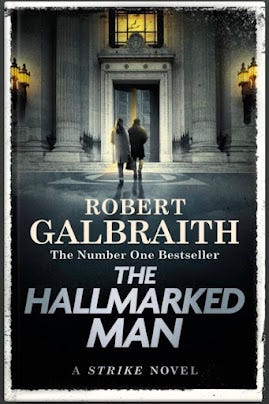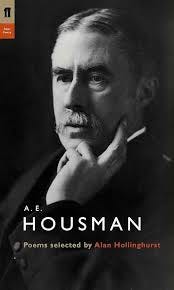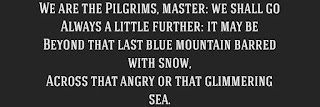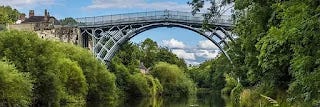Notes on the Epigraph-Writer-Who-Shall-Not-Be-Named:
Spoilers for The Hallmarked Man preview
Robert Galbraith revealed on Twitter months ago that there are five epigraph sources for The Hallmarked Man. Two quotations from John Oxenham's Maid of the Silver Sea have been published. Thanks to the audiobook preview, we now have a second source. . To find out more about it, and how it relates to the ther information we've been given, read on. Spoiler warning.
This epigraph opens the preview:
"And all's to do again." A.E. Housman, Poem 11, Last Poems.
As a prelude to a disgruntled Strike who is grieving the death of one of his St. Mawes surrogate parents while navigating through a drenching rainstorm, this line seems quite appropriate. It is indeed deja vu all over again, given how closely torrential rains were associated with Joan's death in Troubled Blood. Strike is also experiencing a second repeated emotion, resentment of Ryan Murphy and his place in Robin's life, and doubly resenting the fact that he knows he has no right to resent it. But this is also an echo to the jealousy he was feeling during little Benjy Herbert's equally rainy christening celebration.
So, who is A. E. Housman (1859-1936) and what is his connection to John Oxenham? Alfred Edward Housman's Wikipedia entry is long and detailed. Basically, he was a classics scholar and poet. Like Strike, he left Oxford (in Housman's case, after failing his exams) and self-taught himself classics. After leaving Oxford, he engaged in independent classics scholarship and his work was well-respected enough to earn him a professorship first at University College in London and later at Cambridge, He published two volumes of poetry in his lifetime: A Shropshire Lad in 1896 and Last Poems in 1922. His brother Laurence (also a poet) published more of Alfred's poems after the latter's death.
The poem from which the epigraph is taken (sometimes called "Yonder See the Morning Blink" is relatively short, and much more pessimistic than the epigraph line quoted.
Yonder see the morning blink:
The sun is up, and up must I,
To wash and dress and eat and drink
And look at things and talk and think
And work, and God knows why.
Oh often have I washed and dressed
And what's to show for all my pain?
Let me lie abed and rest:
Ten thousand times I've done my best
And all's to do again.This is clearly not the attitude either Strike or Robin take towards their jobs. But, apparently lots of Housman's poems deal with death and the futility of life.
What's the connection to Oxenham? Both lived in the late 19th to mid-20th centuries, and both wrote poems that were set to music by others. Both published poems that were popular during World War I; both (with brother Laurence) are listed on this blog, Forgotten Poets of WW1. Given Strike's interest in this particular period of military history--- recall him helping Jack with his report on the WW1 Battle of Neuve Chapelle--- perhaps WW1 poetry will be a theme? We should also recall this twitter header: a snippet of poetry by James Elroy Flecker that is inscribed on a clocktower memorial to the British Special Air Services. So perhaps poets with military connections will be the common link in the epigraph sources?
Another Twitter header was the Iron Bridge of Ironbridge, which is located in Shropshire, so perhaps we can expect some quotations from A Shropshire Lad in that section
Other than the WW1 connection, Oxenham and Housman seem quite different. Oxenham was a devout Christian whose best-known poetry became popular hymns. If you've read Maid of the Silver Sea or Carette of Sark (see here and here), you know they are pious and uplifting novels with happy endings. Housman was a staunch atheist, known as a cold and even terrifying professor and, as you can see, his poems are a bit of a downer. Interestingly, a longer version of "Yonder" can be found under the name "May." It perks up a little in the middle, but ends on a depressing note.
In any case, given that there are only five epigraph sources and many, many chapters in this very long book, I expect that we gain familiarity with the poems of Housman, just as we did for Rosmersholm and the I Ching.






I read Last Poems on the same day we got the audio sample, and I have to say - there were *so many* passages that would work absolutely beautifully as Strike epigraphs. (My favourite, and one I'd bet money on appearing: " Oh love is rare and trouble plenty \ And carrion cheap" - but there were several more that I bookmarked as being of interest).
This is probably a complete coincidence, but I noticed that Last Poems was published in 1922 - the same year as Hassan, the drama in which we find The Golden Journey to Samarkand (I believe the poem itself was published earlier, but the drama is the larger context of it?). This is also the year that The Maid of the Silver Sea was adapted as a silent film! Probably all total coincidence and simply pointing to an early 20th century time period for the epigraphs, but still pretty neat (is it worth noting that it was also in 1922 that King Tutankhamen's tomb was discovered? With all the mentions of silver bringing to mind images of buried treasure...)
If war poetry is a connection between the epigraphs, I think we can definitely expect that Strike's military experiences might come up in this book, and we might finally learn the story behind his medal (another hint to this is that the excerpt from Samarkand is engraved on an SAS memorial clock in Hereford, where I'm betting Strike and Robin will see it - possibly while visiting the SAS base!). The chapter epigraphs being entirely poetry from a specific period/genre/type of author, with the part epigraphs coming from a work of the same period but a different form, would be a nice echo back to Ink Black Heart's epigraph structure.
Another possibility is that we might see a mix of genre for the first time - we already have one adventure/mystery/romance novel, and now a book of poetry. Might the three other sources come from different literary forms of the period? An esoteric Freemason instruction manual, an absurdist drama, some philosophy, science fiction, or even humour? (I would really, really love to see P. G. Wodehouse as an epigraph source!)
How much I am enjoying these prepublication notes from you! Thank you!